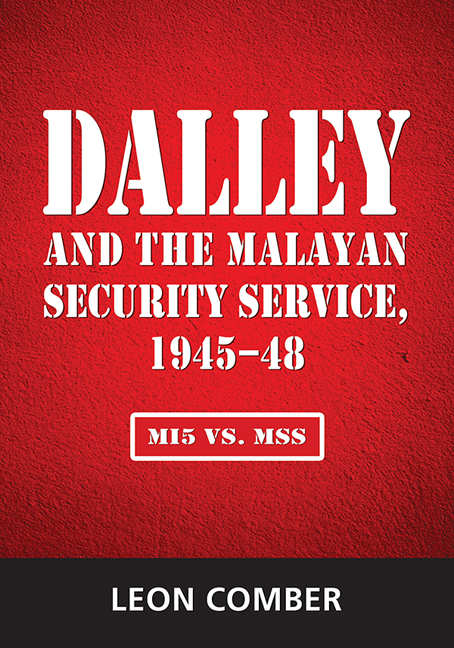Book contents
- Frontmatter
- Contents
- Preface
- Acknowledgements
- List of Abbreviations
- 1 Lieutenant Colonel John Dalley and the MSS: Early Days
- 2 Lieutenant Colonel John Dalley and Dalforce
- 3 The Establishment of “Security Intelligence Far East (SIFE)” in Singapore
- 4 Dalley's Return to Singapore
- 5 The Indonesian Situation and Malaya
- 6 Indonesian Encroachment into Malaya
- 7 Arrangements for Allocation of MSS Staff to Special Branch, Singapore, and Special Branch, Malaya
- 8 Conclusion
- Appendices
- Bibliography
- Index
- About the Author
6 - Indonesian Encroachment into Malaya
Published online by Cambridge University Press: 12 February 2019
- Frontmatter
- Contents
- Preface
- Acknowledgements
- List of Abbreviations
- 1 Lieutenant Colonel John Dalley and the MSS: Early Days
- 2 Lieutenant Colonel John Dalley and Dalforce
- 3 The Establishment of “Security Intelligence Far East (SIFE)” in Singapore
- 4 Dalley's Return to Singapore
- 5 The Indonesian Situation and Malaya
- 6 Indonesian Encroachment into Malaya
- 7 Arrangements for Allocation of MSS Staff to Special Branch, Singapore, and Special Branch, Malaya
- 8 Conclusion
- Appendices
- Bibliography
- Index
- About the Author
Summary
It was undoubtedly a difficult time for any intelligence service. As related previously, Dalley was faced with a serious problem in focusing his attention on the intrusion of PKI elements and supporting left-wing Indonesian political parties into Malaya with the intention of subverting the MNP, Kaum Muda, and other leftwing Malay political parties to rise up against British colonial rule in Malaya, just as the Indonesians had done against the Dutch in Indonesia after the Japanese surrender in August 1945.
Firstly, there was the proximity of Indonesia to Malaya, which was only a stone's throw away across the narrow Straits of Melaka. Medan in Sumatra is only an hour's flight from Penang in Malaya, and even in so-called “normal” times there had always been a considerable amount of illegal traffic, in junks and other small craft engaged in smuggling goods — as well as illegal immigrants — into Malaya from Indonesia, which was difficult to intercept.
In those immediate post war days, immigration control on the west coast of Malaya facing Indonesia became increasingly difficult to impose.1 Many senior British immigration officers had been killed during the Japanese war or were medically boarded out after the war, and they had been replaced by less experienced Malay immigration officers who were not always adverse to their Muslim brothers being allowed to enter Malaya, especially as they spoke more or less the same language, followed the same religion, and looked the same, and not very much attention was given to whether they had valid immigration documents or not. It was probably not considered, anyway, they would create a problem by joining the large numbers of Indonesians who had already been living in Malaya for years.
There was perhaps another more radical school of thought that Malaya should have declared independence from the British on 17 August 1945, just as the Indonesian nationalist leader Sukarno had done in proclaiming Indonesian independence from Dutch colonial rule at the time of the Japanese surrender, as it does not seem likely that the Japanese would have prevented them from doing so as they did not appear averse to leaving behind after their departure political problems for the returning Western colonial powers to settle.
- Type
- Chapter
- Information
- Dalley and the Malayan Security Service, 1945–48 , pp. 88 - 98Publisher: ISEAS–Yusof Ishak InstitutePrint publication year: 2018

